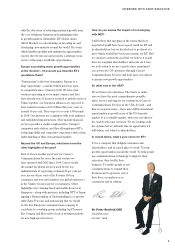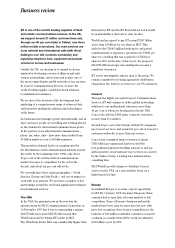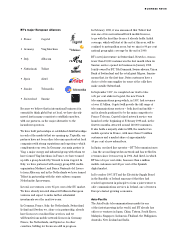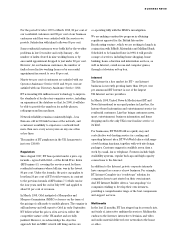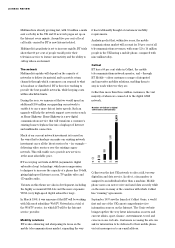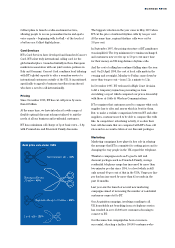BT 1998 Annual Report Download - page 15
Download and view the complete annual report
Please find page 15 of the 1998 BT annual report below. You can navigate through the pages in the report by either clicking on the pages listed below, or by using the keyword search tool below to find specific information within the annual report.Introduction
BT’s earnings of 26.7 pence per share for the year ended
31 March 1998 (the 1998 financial year) compare with
32.8 pence for the 1997 financial year and 31.6 pence for
the 1996 financial year. Earnings per share for the 1998
financial year were affected by two exceptional items. The
first was a receipt of US $465 million from WorldCom, Inc
as a result of the termination of the proposed BT/MCI
Communications Corporation merger; the second was the
one-off windfall tax charge which amounted to £510 million.
Earnings per share for the 1998 financial year before the
two exceptional items were 31.7 pence, a decrease of
3.2% on the previous year, reflecting a number of factors.
In the 1998 financial year, earnings were affected by
initial expenditure incurred by the group’s new European
associates as they become established; a charge of £120
million was incurred as compensation to employee share
option holders for the special dividend paid in September
1997 and an additional charge for interest of approximately
£100 million was incurred from the payment of this special
dividend; BT was also affected by its £63 million share of a
special charge made by MCI in September 1997.
1998 1997 1996
£m £m £m
)))!!
!!!00511111110111
Turnover 15,640 14,935 14,446
Other operating income 372 106 103
Operating costs before
redundancy costs (12,249) (11,429) (11,028)
Redundancy costs (106) (367) (421)
00011!!!00511111110111
Operating profit 3,657 3,245 3,100
Group’s share of
profits (losses) of
associated undertakings (252) 139 82
Profit on sale of group
undertakings 63 8 7
Net interest and
premium payable (249) (189) (170)
00011!!!00511111110111
Profit before taxation 3,219 3,203 3,019
Taxation – ordinary (978) (1,102) (1,027)
Taxation – windfall (510) – –
00011!!!00511111110111
Profit after taxation 1,731 2,101 1,992
Minority interests (25) (24) (6)
00011!!!00511111110111
Profit for the
financial year 1,706 2,077 1,986
00011!!!00511111110111
Earnings per share 26.7p 32.8p 31.6p
Earnings per share
before exceptional
items 31.7p 32.8p 31.6p
00011!!!00511111110111
The results for the 1998 financial year have benefited from
the strong growth in demand for the group’s products and
services and the buoyant UK economy. BT, however,
continued to be affected by the tight regulatory regime
in the UK and growing competition. Price reductions,
including those imposed by the price control formulae,
totalled over £750 million following reductions of over
£800 million in the 1997 financial year and £480 million
in the 1996 financial year. The 1998 financial year also
included lower redundancy costs as a consequence of
the surplus disclosed by the latest actuarial valuation of
the group’s main pension scheme.
The 1998 financial year saw the group increasing its level
of investment in continental Europe to address the
opportunities presented by the full liberalisation of the
telecommunications market from 1 January 1998. Other
features of the year included the break-up of the proposed
BT/MCI merger, the payment of a £2.2 billion special
dividend and the UK Government’s imposition of a windfall
tax on BT and other privatised companies.
The results for the 1997 financial year were adversely
affected by significant redundancy costs of £367 million
and a £60 million premium paid on repurchase of bonds.
The 1996 financial year’s results were also affected by
significant redundancy costs of £421 million and
a £73 million share of another MCI special charge.
Regulation and prices
The period to 31 July 1997 was the last in which the
majority of BT’s main UK services were subject to price
regulation. Under the price controls which were in force up
to that date, BT had to reduce its overall prices for its main
UK services, principally inland and outgoing international
call services and exchange line rentals, under the RPI
minus 7.5 formula. In the two final price control years
under this formula, BT reduced its prices by about 5%
and 2% in the years to 31 July 1997 and 1996, respectively.
From 1 August 1997, a new retail price control came into
force under which a cap of RPI minus 4.5 applies to the
services used by the lowest 80% of BT’s residential
customers by bill size. This new retail price control is
estimated to have covered services representing about 17%
of the group’s total turnover for the year to 31 March 1998.
In the current price control year to 31 July 1998, BT has
already reduced its prices by more than the required
reduction of 1.56%.
Fi n a n c i a l review


